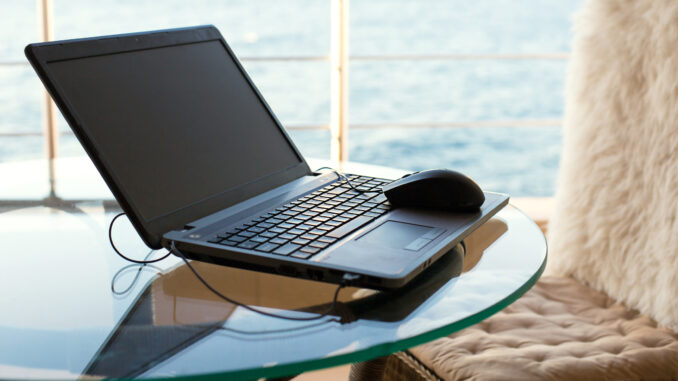
By Larry and Adam Mogelonsky - 2.13.2021
It’s a lucrative and commendable effort for a hotel to investigate any and all means to implement technological solutions that will help to boost the guest experience, save costs, reduce direct human contact or a mix of the three. In what we’re calling the ‘great technology reset for hotels’, the post-pandemic era will see the way hotels operate rapidly evolve from high touch and tech-phobic to widely no touch and tech-philic. But as the metaphorical blood for many of these systems and devices, your wireless internet must work.
This goes far beyond BOH processes. Yes, many properties are moving to a cloud-based PMS while IoT devices are allowing for new levels of product customization and energy savings. While all of these put more strain on your available bandwidth (as well as your security apparatuses, but that’s a whole other topic), requiring diligent IT personnel to monitor them at all times, let’s think about WiFi from the FOH perspective, especially in light of many of the travel behavior changes since COVID-19.
The Rise of the Digital Nomad
This past year has witnessed a profound shift in how, when and where people work. Digital nomadism was a trend well before 2020, but the pandemic accelerated this movement by making remote work mainstream. Although it’s inevitable for the office commute to return, many will choose to keep the flexibility of staying home throughout the week.
Whatever name you choose to call this now-common psychographic, the revenue opportunity for brands is in knowing that if a person can work from anywhere, then that means they can work from your hotel. But much like all of our BOH tech stacks, guests need a fast and uninterrupted internet connection in order to accommodate all those Zoom meetings then chill out afterwards with some Netflix, perhaps streamed poolside.
No doubt you’ve already spent loads of capex to install a great onsite WiFi network and deploy a team to vigilantly monitor it every day. It’s not just the system, however, but how confident these digital nomads are in your network prior to booking.
An Example Scenario
Suppose for next winter, and long after you’ve gotten your vaccine, you and your loved one opt to escape the drudgeries of the cold, gray urban life for a week in the Caribbean. Why a week? If your company policy going forward allows you both to work remotely and you have no in-person gatherings on the books, then you can in theory spend a whole month down south. After a quick check of the finances, you decide just that.
Something is stopping you, though – a lingering fear on the back of your mind. You are hesitant to book a whole month rather than just a week because you aren’t sure if the hotel will have good enough WiFi to support videoconferencing once you arrive. Most people in the modern, globetrotting, professional class can afford to go one week without going online for work. A month is Russian roulette.
Therefore, a lack of confidence in your hotel’s WiFi speed is a dealbreaker for travelers hoping to squeeze in some inbox clearing between mojitos on the beach. For you, the hotelier, it’s a huge difference in the type of guests you can attract as well as how much you can increase LOS. There’s also TripAdvisor. Given this third party’s influence, one “bad WiFi” comment can cost you many thousands of dollars in reservations as guests avoid properties where work may be compromised.
With all this in mind, here are some concluding considerations:
- Test your WiFi. Go all around your property and locate any weak points, especially during peak hours. It’s one thing for the lobby network to function smoothly on a Sunday afternoon; it’s a whole other for it to maintain the same speed on Friday night when you’re at full occupancy and every other guest is streaming videos. Given the recent trends for guest privacy and seclusion, this is doubly true for rural resorts where digital nomads may want to visit but also have the luxury of bringing their laptop out to that gazebo a few yards from the suite’s terrace. Do what can be done for these outlier scenarios.
- Damage control. Invest in a first-class social media aggregate and guest sentiment platform so that you can identify customers who feel let down by your WiFi prowess then react as quickly as possible to address the issue. Ideally, you would want to initiate some sort of mid-stay recovery to help prevent any negative comments from reaching the public realm.
- Update your owned online presence. Think of all the digital assets in your control – the website, its booking engine, social media pages, OTAs and so on. You must make sure that you go through all these to write some new copy or amenity descriptions that inspires confidence in your onsite wireless connectivity. Then there’s also the ones that are beyond your control, for which you should consider using a content parity platform that can update all these disparate vendors on your behalf.
- Develop packages. Tiered WiFi speeds were all the rage five to ten years ago, and it’s questionable at best if such tactics would work nowadays. Rather, consider advertising your WiFi prowess as a selling feature within a package or promotion aimed at customers looking to work from a hotel (either for the aforementioned digital nomads or for day guests). To build these effectively, you will need rich guest profile data in your PMS or CRM in order to discern what other services these types of prospective customers want from their hotel stays.

Larry and Adam Mogelonsky represent one of the world’s most published writing teams in hospitality, with over a decade’s worth of material online. As the partners of Hotel Mogel Consulting Limited, a Toronto-based consulting practice, Larry focuses on asset management, sales and operations while Adam specializes in hotel technology and marketing. Their experience encompasses properties around the world, both branded and independent, and ranging from luxury and boutique to select-service. Their work includes six books “Are You an Ostrich or a Llama?” (2012), “Llamas Rule” (2013), “Hotel Llama” (2015), “The Llama is Inn” (2017), “The Hotel Mogel” (2018) and “More Hotel Mogel” (2020). You can reach Larry at [email protected] or Adam at [email protected] to discuss hotel business challenges or to book speaking engagements.
This article may not be reproduced without the expressed permission of the authors.
Are you an industry thought leader with a point of view on hotel technology that you would like to share with our readers? If so, we invite you to review our editorial guidelines and submit your article for publishing consideration.


